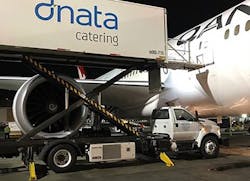ROUSH provides dnata LAX fleet with propane-powered Ford F-750s
ROUSH CleanTech closed out 2019 by delivering eight Ford F-750 trucks using the alternative fuel tech manufacturer’s 6.8L V10 3V propane engine to dnata’s fleet operating at the Los Angeles International Airport, which supplies inflight catering. With the order fulfillment, ROUSH has now built and deployed 20,000 propane autogas vehicles.
The effort started in 2010, and includes a mix of modified Ford medium-duty trucks and Blue Bird school buses. Overall, these near-zero emissions vehicles have accumulated more than 1 billion miles and have been used by 1,200 customers.
ROUSH, based in Livoia, Mich., said these dnata trucks are 90% cleaner than the Environmental Protection Agency’s emissions standard and “certified to the optional near-zero nitrogen oxide (NOx) level of 0.02 g/bhp-hr.”
“Our top priority is to operate a clean and safe fleet,” said Peter DeVito, CEO of dnata catering USA. “With these propane vehicles, we reduce emissions without sacrificing safety or performance.”
The propane autogas is half the cost of diesel and the dnata trucks will fill up at mobile fueling stations. Public fueling stations are also available.
“The economics of propane autogas are hard to ignore,” DeVito said. “Propane helps keep our budget in check because the fuel costs a lot less and requires less maintenance than diesel or gasoline.”
The Propane Education & Research Council claims the hydrocarbon gas known for fueling the best barbecues also offers fleets the lowest total cost of ownership when considering amount of emissions reduced.
UPS has deployed propane-powered trucks for more than six years in its effort to grow its sustainable fleet, which will also include 6,000 more CNG trucks by 2022.
Propane was lauded for the easy installation of the tanks, which can be dropped into place by crane and require little to no extra infrastructure.
Typically, the metropolitan areas are the only places we have the infrastructure in place to deploy the [alternative fuel] technologies,” said Kelly Pruitt, a UPS area automotive manager for the South Atlantic district. “This gives us the ability to branch out a little bit further.
Pruitt said inventory and training costs were able to be kept lower due to the propane trucks’ similarity to conventional gasoline-powered vehicles.
About the Author
Fleet Owner Staff
Our Editorial Team
Kevin Jones, Editorial Director, Commercial Vehicle Group
Cristina Commendatore, Executive Editor
Scott Achelpohl, Managing Editor
Josh Fisher, Senior Editor
Catharine Conway, Digital Editor
Eric Van Egeren, Art Director
